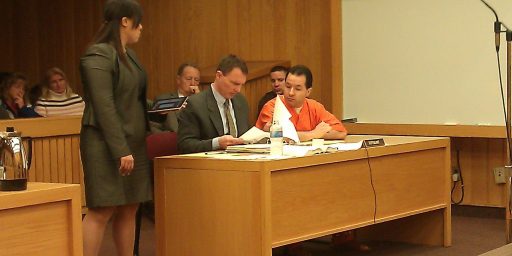Checks and Balances, RIP
George Will has a column in today’s WaPo, “Making Congress Moot,” making a point that I’ve been making about the Bush administration’s dubious use of TARP funds to bail out the auto companies.
Congress’s marginalization was brutally underscored when, after lawmakers did not authorize $14 billion for General Motors and Chrysler, the executive branch said, in effect: Congress’s opinions are mildly interesting, so we will listen very nicely — then go out and do precisely what we want.
On Friday the president gave the two automakers access to money Congress explicitly did not authorize. More money — up to $17.4 billion — than had been debated, thereby calling to mind Winston Churchill on naval appropriations: “The Admiralty had demanded six ships: the economists offered four: and we finally compromised on eight.”
The president is dispensing money from the $700 billion Congress provided for the Troubled Asset Relief Program. The unfounded assertion of a right to do this is notably brazen, given the indisputable fact that if Congress had known that TARP — supposedly a measure for scouring “toxic” assets from financial institutions — was to become an instrument for unconstrained industrial policy, it would not have been passed.
This isn’t even slightly hyperbolic. The thing is, though, as Dave Schuler noted on Wednesday’s OTB Radio, Congress has the ability to stop this — and virtually every other bit of executive overreach that many of us constantly complain about — at any time it musters up the will to do so. That it hasn’t means, essentially, that it doesn’t want to.





Yes, congress could but it isn’t-either because it is okay (or at least the leadership is okay) and/or because they don’t want to take risks and would rather the executive get all the blame. They will claim victory for success no matter what.
Congress is weak IMO and they are a huge part of why they are weak.
If we believe Paulson, Congress was voting down the auto bailout, while begging him to do it for them:
If that’s true it might be less a loss of representative democracy, and more a case of how sausage gets made.
Washington doesn’t “like” the auto bailout, but somehow still “needs” it. Easy solution, get the lame duck to do it.
As long as we continue to elect bureaucrats and apparatchiks to the Congress this is the Congress we will get.
But it very much matters how things are done and this is yet another in a long line of power grabs by this administration along with abdications by the Congress (under both Dem and Rep leadership, I would note). This is not a good thing.
I’m not saying it’s a good thing Steven, but I think collusion is not the same as abdication.
Well until two years ago congress, controlled by the Republicans, was a total echo chamber for Bush. For the past two years the Democrats have notionally been in charge but in fact they didn’t have an effective governing majority with only 51 votes in the senate, the continual invocation of procedural filibuster rules by the Republicans, and a Republican president who vetoed only one bill during his first six years in office but vetoed numerous bills coming out of the last congress. In fact the auto bill which Will spends a lot of time pontificating about actually had majorities in house and senate but was blocked again by Republican procedural moves although this time a president from their own party wanted it passed! Go figure.
In the upcoming congress there’s no doubt the Democrats have a governing majority although they are not going to get to sixy in the senate. There are at least 10 Republican senators who through a mixture of sentiment and electoral fears for 2010 are going to vote with the Democrats on most substantive issues. Obama has also made an inspired group of cabinet and white house picks who by and large have the respect of moderate and pragmatic Republicans in congress. This brings us to the Republican rump of very conservative members of congress. Judging by reaction to the car rescue bill they have clearly decided to play a noisy if ineffective spoiler role. On the whole this is probably going to do Obama and his agenda much good and the Republican party much harm. Since Obama has clearly engendered much goodwill because of the discipline and order of his transition, and polls show about two thirds of the country agrees with his agenda, blocking it by a series of agressive and extreme sounding tactics is going to be suicidal but clearly a faction in the GOP has decided that this is what they want to do.
I disagree. The TARP arguably authorized bailout of the auto industry. The complaint was made at the time. Congress delegated broad power to the President. Just like Congress delegated broad power to the President in the Authorization of the Use of Military Force by whatever means necessary. Just like when Congress delegated broad power to the EPA to regulate any harmful substance (like Carbon Dioxide).
It’s not usurpation when the Congress delegates the power.
IIRC Chris Dodd started one of the auto bailout hearings by complaining that the President has not done what he was asked to do with the TARP. (Does anyone else recall this?)
The President —elect’s choice for Secretary of Education, Arnie Duncan, hatches evil plot with cereal companies, Read more at,
No, it’s abrogation of responsibility. The Congress is properly criticized for this not the executive.
Wait a minute Dave, now you are for the bailout?
(If you are against the bailout there’s no way you can make the case that no bailout from Congress is worse than a bailout from Congress! All the President needed to do at that point was say no.)
That said I’m not sure the “sunk costs” argument is a bad one. Congress gave the Administration $700B to spread around and “save” the economy. That horse is gone with little oversight.
No, I’ve always been against the bailout and continue to be against it. I just think that Congress deserves most of the blame.
Our Constitution is written in such a way that Congress has most of the power and, unfortunately, in the modern day in which we’ve abandoned the idea of government by enumerated powers is in fact all-powerful.
Whenever our government does something you don’t like, don’t blame the president. It’s nearly always the Congress’s fault.
I am not for the bailout, either. But, if there is going to be one, it should have come via Congress, not via executive fiat.
ottobvs- its not a partisan issue, no matter how much you hate republicans and want to pin blame on them. congressmen of both parties willingly going along with the current arrangement of executive usurpation of legislative power. as long as the congressmen don’t rock the boat they get elected, grow fat, and stay happy.
this may be my youthful naivete showing, but would repealing mccain-feingold have any positive effect on creating a serious third party challenger? a lot has changed in the business of disseminating information since 2002 that would seem to be perfect for allowing an unconventional political actor to challenge and shake up the status quo.
As one whos been complaining of a “lap dog” congress for years, I have to say that Dave is absolutely correct when he says:
except for the last part about the executive not being criticized. While the executive always wants to expand his powers (it is human nature), does that make it right? No. Power corrupts, and Presidents need to be reminded of this fact.
Which is all the more reason to criticize congress vociferously and forcefully for abrogating their responsibilities, and thereby reminding the executive of the limits of his power.
All that said, I hold out no hope for the near future.
The Congress has been spineless for quite a while. The Executive branch has also been very good at grabbing power, using judicial fiat and secrecy.
I think this is, partially, due to our changing media. Cable TV and talk radio have become biased cheerleaders. They center their efforts on the President. There are too many Congressmen and Senators to turn them into real celebrities, though McCain came close. While I regularly rail against Congress on my own little blog, I do think the odds are stacked against them in a battle with the Executive branch.
Steve
Even a day later I find this thread pretty bizarre, especially hanging off auto bailouts. Congress did not bail out the auto companies. I still can’t get my head around the idea that “while it was wrong, if anyone was going to do it, it was them.”
Talk about torturing yourself to protect your ideology and allies!
Specifically for the auto companies, if you want to blame anyone, blame the Administration that made the deal.
On the broader TARP process, it was an agreement between the Administration and Congress. If you want to blame anyone there, blame Washington. The truth is that the power-players there were in it together.